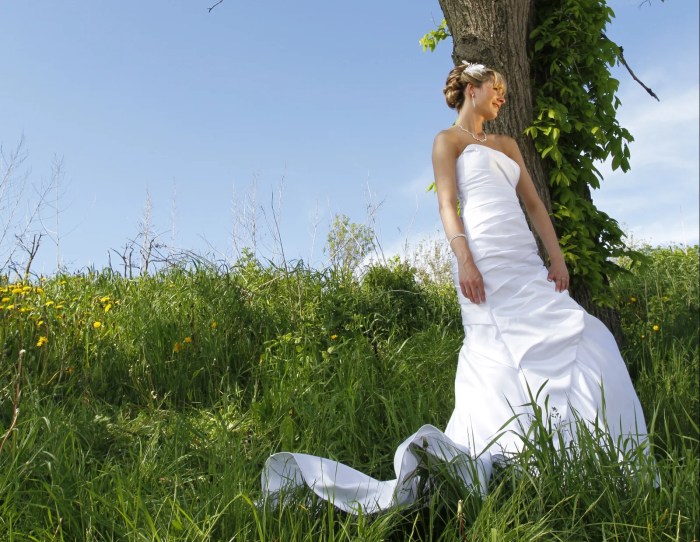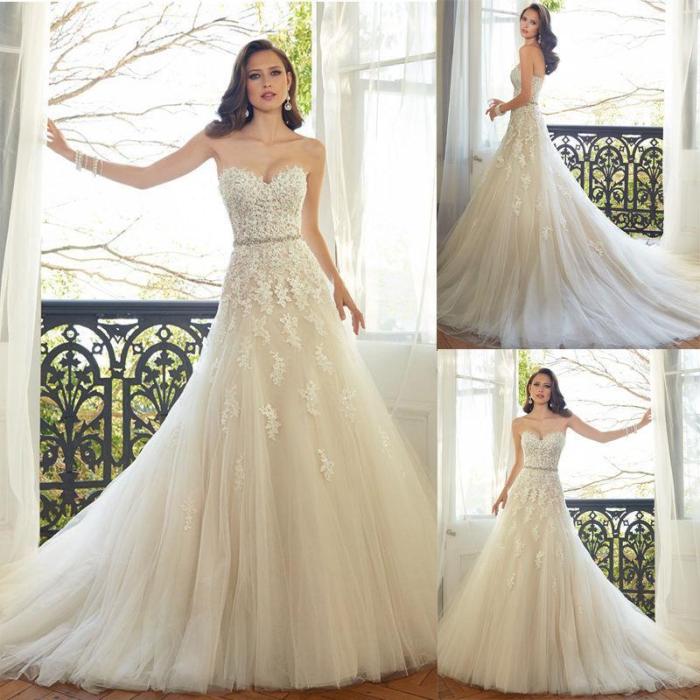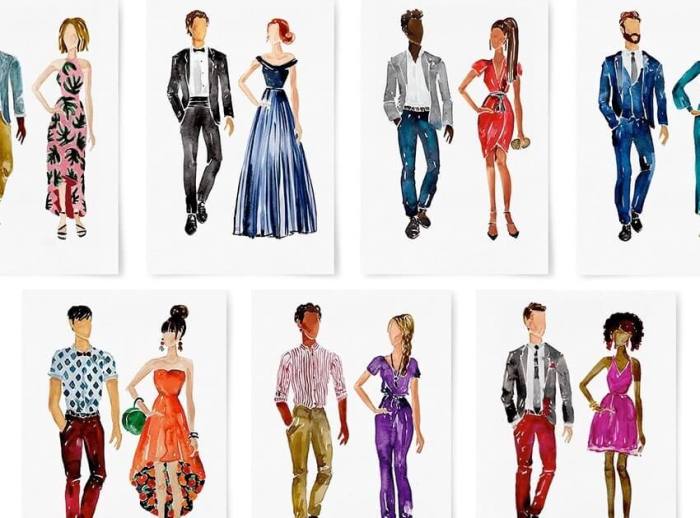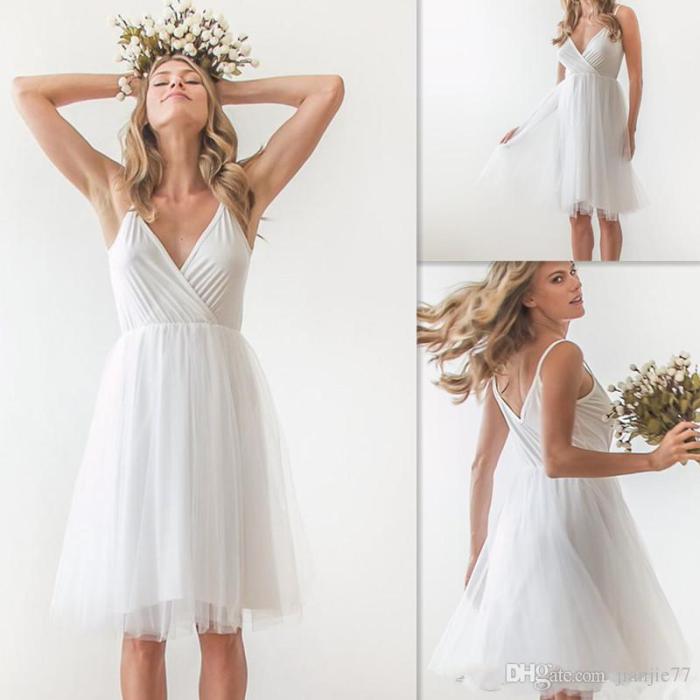The Enduring Allure of Ivory Wedding Dresses: Ivory Color Wedding Dresses

Source: wedding-promises.com
Ivory color wedding dresses – Ivory wedding dresses have held a captivating place in bridal fashion for decades, evolving from a symbol of purity to a versatile choice reflecting modern trends and individual style. This exploration delves into the history, shades, styles, and styling of ivory wedding dresses, offering a comprehensive guide for brides-to-be.
Popularity and Trends of Ivory Wedding Dresses
Ivory’s enduring popularity in bridal wear stems from its rich history and adaptability to contemporary fashion. Initially associated with purity and innocence, much like white, ivory has gradually embraced a wider range of connotations, reflecting sophistication, elegance, and a touch of romantic vintage charm.
Current fashion trends showcase ivory’s versatility. The rise of minimalist aesthetics often features clean lines and simple silhouettes in ivory, while romantic styles incorporate intricate lace, delicate beading, or flowing fabrics. Bohemian-inspired gowns often use ivory as a base, allowing for natural textures and earthy accents. The popularity of ivory remains strong, competing favorably with classic white and the warmer tones of champagne.
While white remains the most traditional choice, ivory offers a softer, more nuanced alternative.
A comparison reveals that white often conveys a more stark, formal feel, while champagne presents a warmer, potentially more casual tone. Ivory occupies a middle ground, blending the purity of white with the warmth of champagne, making it suitable for a broad range of wedding styles and venues.
The evolution of ivory wedding dresses can be traced through a timeline: Early 20th-century ivory dresses were often simpler, reflecting the era’s styles. Mid-century designs incorporated more elaborate embellishments. Later decades saw a shift towards diverse silhouettes and the integration of modern fabrics and techniques. The 21st century showcases a wide array of ivory styles, from classic ballgowns to modern sheath dresses, proving its timeless appeal.
Shades and Undertones of Ivory

Source: weddbook.com
Ivory isn’t a single color; it encompasses a spectrum of shades and undertones, significantly influencing the final look of the dress. Understanding these nuances is crucial for choosing a dress that complements your skin tone and personal style.
Common ivory shades include: Classic Ivory, a pure, bright ivory; Soft Ivory, a lighter, more delicate shade; Cream Ivory, a warmer, yellowish ivory; Antique Ivory, a slightly darker, aged ivory; and Eggshell Ivory, a pale, creamy shade. Undertones—warm, cool, or neutral—affect the perceived color temperature. Warm ivory has yellowish undertones, cool ivory has bluish or pinkish undertones, and neutral ivory sits between these two extremes.
Fabric type also plays a role; heavier fabrics can deepen the shade, while lighter fabrics might appear brighter.
The choice of ivory should be carefully considered based on your skin tone. Warm-toned skin often complements warm ivory shades, while cool-toned skin might look better in cool or neutral ivories.
Ivory wedding dresses offer a timeless elegance, a classic choice for brides seeking sophistication. For those considering cultural fusion, exploring the vibrant options available in Indian wedding attire can be incredibly inspiring; a quick look at indian dresses for wedding function showcases the rich variety. The exquisite detail and color palettes of these dresses often complement the subtle beauty of an ivory gown, providing inspiration for unique bridal styles.
| Ivory Shade | Undertones | Suitable Skin Tones | Fabric Example |
|---|---|---|---|
| Classic Ivory | Neutral | Most skin tones | Silk Satin |
| Soft Ivory | Cool | Cool to neutral skin tones | Lace |
| Cream Ivory | Warm | Warm skin tones | Tulle |
| Antique Ivory | Warm | Warm to neutral skin tones | Brocade |
| Eggshell Ivory | Neutral | Most skin tones | Organza |
Ivory Wedding Dress Styles and Silhouettes
Ivory lends itself beautifully to a variety of wedding dress styles and silhouettes. The choice depends on personal preference, body type, and the overall wedding theme.
Popular silhouettes include A-line, ballgown, mermaid, sheath, and empire waist. Necklines such as sweetheart, V-neck, halter, and off-the-shoulder styles all complement ivory. Sleeve styles range from sleeveless to long sleeves, including cap sleeves, three-quarter sleeves, and bell sleeves. Embellishments like lace, beading, and embroidery add texture and visual interest, enhancing the elegance of the ivory fabric. Common fabrics for ivory wedding dresses include silk, satin, lace, tulle, organza, chiffon, and crepe, each offering a unique drape and texture.
- Silk: Luxurious and flowing.
- Satin: Smooth and glossy.
- Lace: Delicate and romantic.
- Tulle: Light and airy.
- Organza: Sheer and crisp.
- Chiffon: Soft and drapey.
- Crepe: Structured and matte.
Styling Ivory Wedding Dresses
Accessorizing an ivory wedding dress allows for creative expression and personalization. The choice of accessories should complement the dress’s style and the overall wedding theme.
For a rustic wedding, consider a flower crown, a simple veil, and natural-looking makeup. A modern wedding might call for sleek accessories like a geometric headpiece, statement earrings, and a bold lip. A classic wedding could incorporate a cathedral-length veil, delicate jewelry, and a soft, romantic updo. Veils and headpieces significantly impact the overall look; a birdcage veil adds a vintage touch, while a cathedral-length veil conveys elegance and grandeur.
Makeup and hair should harmonize with the chosen style; a natural makeup look complements a bohemian style, while a more defined look suits a classic or modern aesthetic.
Here are three example bridal looks:
- Bohemian Chic: A flowing A-line ivory gown with lace detailing, paired with a flower crown, loose waves, and minimal makeup.
- Classic Elegance: A classic ballgown in ivory satin, complemented by a cathedral-length veil, a delicate pearl necklace, and a softly curled updo with subtle makeup.
- Modern Minimalist: A sleek sheath dress in ivory crepe, accessorized with a geometric headpiece, statement earrings, a bold lip, and a sleek low bun.
Finding the Perfect Ivory Wedding Dress, Ivory color wedding dresses
Choosing the perfect ivory wedding dress involves careful consideration of several factors.
Body type and personal style are paramount. Different silhouettes flatter different body shapes; A-line dresses are generally flattering on most body types, while mermaid dresses accentuate curves. The dress should reflect your personality and the overall wedding aesthetic. Finding a well-fitting dress often requires alterations to achieve the perfect fit. Ready-to-wear dresses offer convenience and affordability, while custom-made dresses allow for complete personalization but come with a higher price tag and longer lead times.
To shop effectively, start by researching different designers and styles. Visit bridal boutiques and try on various dresses to find the one that best suits you. Don’t hesitate to ask questions and seek advice from bridal consultants. Remember to factor in budget, timeline, and alterations when making your final decision.
FAQs
How do I determine if a warm or cool ivory shade suits me?
Consider your skin’s undertones. Warm undertones pair well with warm ivory shades, while cool undertones complement cool ivory shades. Neutral undertones offer more flexibility.
Can I wear ivory if I’m not fair-skinned?
Absolutely! The key is selecting the right shade of ivory and undertone to complement your skin tone. A skilled bridal consultant can guide you in finding the perfect match.
What are some budget-friendly options for finding an ivory wedding dress?
Consider sample sales, consignment shops, online retailers, and off-the-rack options. Prioritize features that are important to you and be open to slight alterations for a perfect fit.
How far in advance should I start shopping for my ivory wedding dress?
Ideally, begin shopping 9-12 months before your wedding date to allow ample time for alterations and potential delays.


